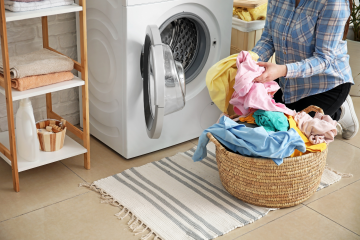What can we do for you
Nightingale
Home Care Services
At Nightingale, we prioritize your needs by designing our services around open communication and your unique requirements. Whether you’re at home, in the hospital, or in a retirement community setting, we offer a comprehensive range of services aimed at enhancing your quality of life and providing peace of mind. Our dedicated team of Caregivers, Certified Nursing Assistants (CNAs), Licensed Practical Nurses (LPNs), and Registered Nurses (RNs) is committed to meeting your needs with personalized care options tailored to your preferences and circumstances.

Personal Care
Our personal care services are tailored to help individuals with daily personal hygiene and grooming. Care Professionals can assist with tasks like bathing, dressing, toileting, mobility, and more.

Homemaking
Maintaining a clean and organized living space is essential for both physical and mental well-being. Our homemaking services include light housekeeping.

Certified Nursing Assistant
Our personal care services are tailored to help individuals with daily personal hygiene and grooming. Care Professionals can assist with tasks like bathing.

Companionship
Loneliness and social isolation can have a significant impact on mental and emotional well-being. Our companionship services are designed to provide friendship and emotional support.

Travel Assistant
Our energetic personal care assistants can help in packing, companionship in transportation, luggage, hotel check-in and more. Don’t let your age or disability keep you from getting around.

Light Housekeeping
For those requiring more advanced medical support, our certified nursing assistants are available to provide skilled care in the comfort of your home.
Elevate Your Home Care Experience with Nightingale Home Care Services
At Nightingale Home Care Services, we’re committed to delivering unparalleled care customized to meet your specific needs. Our compassionate team is devoted to providing unwavering support, guaranteeing both comfort and peace of mind for you and your loved ones. Reach out to us today and experience firsthand the transformative impact Nightingale can bring to your life.

Structured Family Caregiving Program
Get Paid To Care
You may be eligible for Home Care Services

Contact Us
Q&A: Home Care Services
– We offer a wide range of home care services tailored to meet the individual needs of our clients. These services include :
Personal Care: Assistance with activities of daily living (ADLs) such as bathing, grooming, dressing, toileting, and mobility assistance.
Companion Care: Providing companionship and emotional support, engaging in conversation, playing games, accompanying clients on outings, and offering socialization opportunities.
Medication Reminders: Ensuring clients take their medications as prescribed, monitoring medication schedules, and providing assistance with medication management.
Meal Preparation: Planning and preparing nutritious meals based on dietary preferences and restrictions, as well as assistance with feeding if needed.
Light Housekeeping: Performing light housekeeping tasks such as laundry, dishes, vacuuming, dusting, and maintaining a safe and clean living environment.
Transportation: Assisting with transportation to medical appointments, grocery shopping, errands, social activities, and other outings.
Respite Care: Providing temporary relief for family caregivers by offering support and assistance with caregiving responsibilities.
Specialized Care: Tailored care plans for clients with specific medical conditions or needs, such as Alzheimer’s or dementia care, post-surgery care, diabetes management, or hospice support.
Fall Prevention: Implementing measures to reduce the risk of falls in the home, such as removing tripping hazards, installing grab bars, and assisting with mobility.
24-Hour Care: Around-the-clock care and supervision for clients who require continuous support due to advanced age, chronic illness, or disability.
At Nightingale, we typically follow a careful matching process to ensure that caregivers are well-suited to meet the specific needs and preferences of their clients. Here’s an overview of how this matching process might work:
Assessment: We conducts an initial assessment of the client’s needs and preferences. This assessment may include factors such as the client’s medical condition, mobility level, personality traits, cultural background, and scheduling requirements.
Caregiver Screening: We evaluates the qualifications, skills, experience, and availability of its caregivers. This includes considering factors such as the caregiver’s training, certifications, background check results, and past experience working with clients with similar needs.
Matching Criteria: We use the information gathered from the assessment and caregiver screening to identify caregivers who are a good match for the client. This involves considering factors such as the caregiver’s skill set, personality, availability, and location.
Client Preferences: We take into account any specific preferences or requests expressed by the client or their family members regarding the type of caregiver they prefer to work with.
Introduction and Trial Period: Once a potential match is identified, we introduce the caregiver to the client and/or their family members. This allows both parties to meet each other, discuss expectations, and determine if they feel comfortable working together. Some agencies may also offer a trial period during which the client can evaluate the caregiver’s performance before making a final decision.
Ongoing Monitoring and Feedback: We monitors the relationship between the caregiver and client on an ongoing basis, soliciting feedback from both parties to ensure that the match remains compatible. If adjustments are needed, the agency may reevaluate the matching process and make changes as necessary.
By following this careful matching process,Nightingale strive to create positive and productive relationships between caregivers and clients, ultimately enhancing the quality of care provided.
At Nightingale, caregivers typically need to meet certain qualifications and requirements. While specific requirements may vary depending on the agency and the type of care provided, here are some common qualifications:
Certification: Caregivers may need to have certification as a Certified Nursing Assistant (CNA) or Personal Care Aide (PCA) from an accredited program. These certifications involve completing training courses and passing competency exams.
Background Check: Caregivers are usually required to undergo background checks, including criminal background checks, to ensure they have no history of abuse or neglect.
Training: Caregivers often receive training in areas such as basic caregiving skills, infection control, CPR and first aid, communication techniques, and handling medical emergencies.
Experience: Many agencies prefer caregivers with previous experience in caregiving, whether in a professional setting or as family caregivers.
References: Caregivers may need to provide references to demonstrate their reliability, professionalism, and suitability for the role.
Physical Fitness: Caregivers should be physically able to perform the tasks required of them, which may include lifting, assisting with mobility, and providing personal care.
Communication Skills: Good communication skills are essential for caregivers to effectively interact with clients, their families, and other healthcare professionals.
It’s important to inquire about the specific qualifications and requirements of caregivers when considering a home care agency in Georgia. Additionally, verifying that the agency is licensed and adheres to state regulations can help ensure quality care for you or your loved ones.
Medicaid: Georgia’s Medicaid program may cover certain home care services for eligible individuals. This can include personal care services, nursing services, and therapy services.
Medicare: While Medicare typically does not cover long-term home care services, it may cover short-term home health care services if prescribed by a doctor and if certain conditions are met.
Private Pay: Individuals can pay for home care services out of pocket. This option gives more flexibility in choosing the type and frequency of services.
Long-Term Care Insurance: Some individuals may have long-term care insurance policies that cover home care services. It’s important to review the policy details to understand coverage.
Veterans Benefits: Veterans and their spouses may be eligible for home care benefits through the U.S. Department of Veterans Affairs (VA) if they meet certain criteria.
Medicaid Waiver Programs: Georgia offers Home and Community Based Services (HCBS) Waiver programs that provide home care services to Medicaid-eligible individuals who prefer to receive care at home rather than in a nursing facility.
Programs of All-Inclusive Care for the Elderly (PACE): PACE is a Medicare and Medicaid program that provides comprehensive medical and social services to certain frail, elderly individuals, including home care services.
At Nightingale, individuals have several private pay options to cover the costs of home care services:
Out-of-Pocket Payments: Clients or their families can pay for home care services directly from their own funds. This option provides flexibility in choosing the type and frequency of services without relying on insurance coverage.
Long-Term Care Insurance: Some individuals may have long-term care insurance policies that cover home care services. These policies typically have specific coverage limits and may require meeting certain criteria for eligibility.
Reverse Mortgages: Homeowners who are 62 years or older may consider utilizing a reverse mortgage to finance their home care expenses. This allows homeowners to convert a portion of their home equity into cash to cover ongoing expenses, including home care services.
Health Savings Accounts (HSAs) and Flexible Spending Accounts (FSAs): If eligible, individuals can use funds from their HSAs or FSAs to pay for eligible medical expenses, including home care services. These accounts offer tax advantages for qualified healthcare expenses.
Private Financing Options: Some financial institutions offer private loans or lines of credit specifically designed to cover healthcare expenses, including home care services. Individuals can explore these financing options to help manage the costs of care.
Personal Assets: Clients may choose to liquidate or utilize personal assets, such as savings, investments, or retirement accounts, to cover home care expenses.
Annuities: Individuals may consider using annuities as a source of income to fund their home care expenses. Annuities provide regular payments over a specified period, which can help cover ongoing care costs.
Family Contributions: Family members may contribute financially to help cover the costs of home care services for their loved ones. This can be done through direct payments or by pooling resources within the family.
It’s essential to carefully review and consider all available private pay options to determine the most suitable approach for covering home care expenses in Georgia. Consulting with a financial advisor or elder care specialist can also provide valuable guidance in exploring these options.
Yes, we do! If you are interested in signing up for Nightingale’s AutoPay Option, please access the form below, fill it out completely, and submit it to Nightingale’s Director of Billing.
